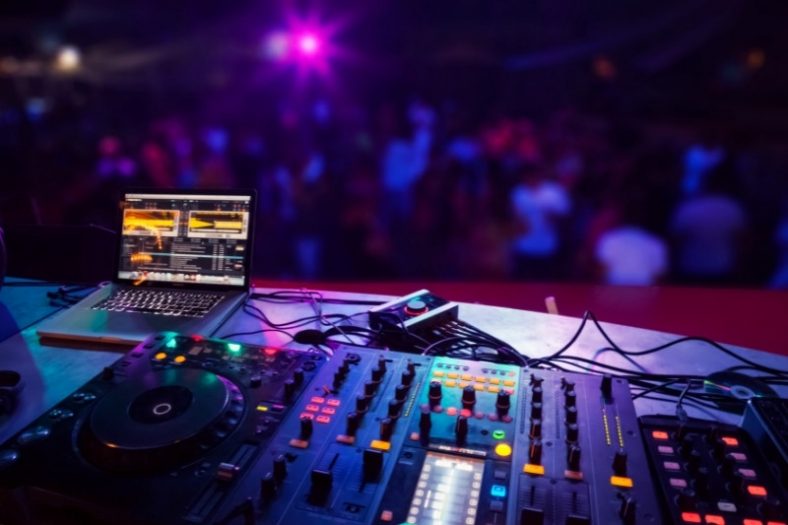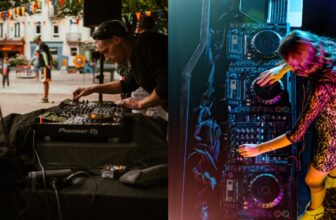Do DJs need a License?

DJs need a license to perform and publish mixes with songs by other artists, even if they’re not getting paid to do so. In many cases, this license is covered by the venue in which the DJ is performing. Merely buying a record doesn’t give DJs the right to perform the songs contained in the record.
You only need two things to make a great DJ set: a bit of artistry and an excellent taste in music. But to legally perform such a DJ set in front of an audience (even an online audience), you’ll also need a DJ license.
Unlike a driver’s license, a DJ license isn’t something you get by attending an exam or signing up to a given organization, but rather something you obtain on a track-per-track basis. What does this mean?
It means simply that you need to license every song that’s featured in your DJ set or mix. If you’re hired to perform at a music venue or nightclub, this cost is likely covered by the people responsible for running the place. But if you’re performing on your own, sharing your DJ skills online, or publishing a DJ mix, things can get trickier.
To understand why DJs need a license, it’s first important to take a closer look at how music copyright works and why it is so important.
Important note: we are not lawyers, if in doubt then get legal advice! That said, this should act as a very useful overview of DJ licensing based on our understanding from a combination of experience and research.
Contents
Why Do DJs Need a License?
DJs need a license because of music copyrights. Unless you’re a special kind of DJ who only plays original songs, there’s a chance your DJ set features many songs by other artists. These songs wouldn’t exist if it wasn’t for their hard work, so it’s only fair that they should get compensated for it.
Music copyrights exist so the work of an artist or author isn’t explored solely for the benefit of others. Even as a DJ, for instance, you should be entitled to copyrighting a DJ mix. This way, any time your DJ mix gets played on a store or streamed online, you can benefit from it.
This is why you need to license every song featured in your DJ sets and mixes. Otherwise, you’d be taking away from the artists who put their soul into creating the tunes that make your work as a DJ so much easier. But how can you even do this?
How Do DJs Get a Music License?
DJs must obtain music licenses by getting in touch with all the three main performance rights organizations (PROs) in the United States: BMI, ASCAP, and SESAC. If you reside outside the United States, you need to contact the PRO or PROs that are active in your country.
Performance rights organizations are responsible for managing the copyrights of all creative workers, including the artists that end up on your DJ sets and mixes. Following a live performance or publication of a DJ mix, DJs should make a list of all the songs they used and report it to the PROs in their country. Then, they will be asked to pay a sum for each of the songs used.
Don’t worry: the purpose of a PRO is to ensure that this sum is given to the people who deserve it, i.e., the copyright holders. Copyright holders include not only the artist who created the song but also the publishing company that released it, as well as any additional composers and performers that may own a percentage of the song.
Tip: If you reside in Europe, SACEM (France), GEMA (Germany), and PRS for Music (United Kingdom) are the top choices depending on where you live.
What about sampling and remixes?
There’s more than one type of copyright, but DJs generally need to be aware of one: public performance rights. Public performance rights are basically a deal between the performer and composition owner that gives the performer the right to play a song publicly, online, or on the radio.
Public performance rights get paid according to the number of times a work of art is used publically. If a song makes it to thousands of DJ sets, the song’s copyright holders will likely make a lot of money. If a song never gets performed publically, then its copyright holders won’t receive a penny for its public performance rights.
Sampling and remixing, however, is trickier, as it may involve letting go of a percentage of the ownership of a work of art. It all depends on the situation. If you’re using public domain/free-to-use songs then you don’t need a license to distribute or even record/publish that remix.
If you’re doing your remixing live, as most DJs tend to do, then that does not fall under any illegal scenario because you are not distributing it and that product is basically a result of your live performance. Note: If you plan on recording, releasing, or publishing that live work – then you would need a license.
Lastly, if you’re making a remix for the purpose of releasing it through your record label and hopefully top the charts, you would need a license from the copyright owner of the piece. Naturally, you attribute a percentage to the original owner due to using the original material as a way of both parties making their fair share.
Disclaimer: Copyright laws are territorial and may slightly differ from country to country, be sure to check the laws in your home country before pursuing any musical endeavors.
What Happens If a DJ Performs Without a License?
Since DJs are legally required to license the songs they use in their live performances and DJ mixes, performing without a license can result in a lawsuit for copyright infringement.
Yes, you may have tons of DJ friends who perform without a license weekly and never once had trouble with the law. But copyright infringement lawsuits exist, and they can not only take a toll on your finances but put an end to your DJ career overnight! Flushing all of your hard work down the drain just to avoid paying a few dollars in licensing costs is just not worth it.
The best way to make sure you’re not getting on the nerves of a fellow artist or music publisher is to be very thorough about licensing the songs you use in your DJ sets and mixes. If your manager or employer is taking care of the licensing for you, make sure he or she is doing a good job.
Additionally, you can get an extra layer of protection by buying DJ insurance.
Is Copyright Infringement Covered by DJ Insurance?
Most DJ insurances cover legal fees, and these include fees relating to copyright infringement lawsuits. DJs should get insured. Even if you’re doing your best to get a license for the songs you use, DJ insurance offers an extra layer of protection and some much-needed peace of mind.
Through DJ insurance, you also have access to other protections. These include most commonly insurance against bodily injury and third-party property damage.
Conclusion
Let’s face it: DJs wouldn’t exist if it wasn’t for the other artists putting out the amazing tracks they mix, remix, and sample. Creating a solid DJ set or mix is not easy and takes a lot of hard work. But great songs, pretty much like wood in a fireplace, are the essential raw material that fuels a DJ’s life work.
When you think about this, it makes sense that the artists that are helping your DJ sets and mixes to shine should be compensated for their art. That’s what copyright laws are for, and that’s why you should never forget to obtain a DJ license.





